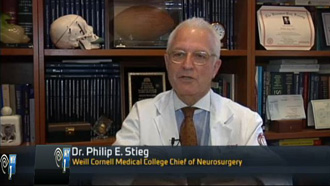
Dr. Philip Stieg, Neurosurgeon-in-Chief of NewYork-Presbyterian/Weill Cornell Medical Center and Director of the Weill Cornell Brain and Spine Center, appeared on New York 1 this morning to discuss the challenge of diagnosing and treating concussion and other mild traumatic brain injury (mTBI).
With this Sunday’s Super Bowl on everyone’s mind, athletes from pee-wees to the pros are thinking about the long-term effects of concussion. In the NFL, players have plenty of reason to be concerned about the cumulative effects of repeated concussion, as new studies have shown greater risk for later complications than had been previously known. Parents of prospective football players are concerned about allowing their children to play, and to assume that risk.
"What we now have to clarify is the significance of mild traumatic brain injury as it relates to multiple events and how it could affect your long-term development," says Dr. Philip E. Stieg, Weill Cornell Medical College's Chief of Neurosurgery.
Dr. Stieg appeared on the show as GE and the NFL announced the awarding of grants to study the diagnosis and treatment of concussion and other mTBIs. Weill Cornell is one of the recipients of those grants, funding a research initiative seeking new ways to diagnose a concussion and determine its severity.
"In mild traumatic brain injury there are no changes on CAT scans and variable changes on the MRI scan," says Dr. Stieg. “With that limited data we can’t tell you, if you come into me with a head bonk, how bad it's going to be and how long you're going to be laid up.”